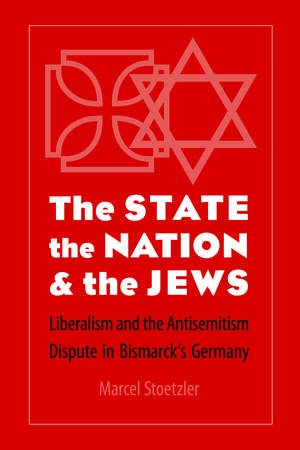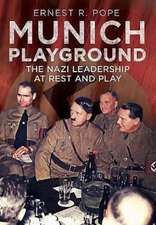The State, the Nation, and the Jews: Liberalism and the Antisemitism Dispute in Bismarck's Germany
Autor Marcel Stoetzleren Limba Engleză Hardback – 31 dec 2008
The State, the Nation, and the Jews is a study of Germany’s late nineteenth-century antisemitism dispute and of the liberal tradition that engendered it. The Berlin Antisemitism Dispute began in 1879 when a leading German liberal, Heinrich von Treitschke, wrote an article supporting anti-Jewish activities that seemed at the time to gel into an antisemitic “movement.” Treitschke’s comments immediately provoked a debate within the German intellectual community. Responses from supporters and critics alike argued the relevance, meaning, and origins of this “new” antisemitism. Ultimately the Dispute was as much about Germans and how they could best consolidate their recently formed national state as about Jews and those who hated them. Treitschke’s liberal antisemitism threw into sharp relief the antinomies inherent in the modern constellation of state, culture, and society.
In a newly united Germany the Dispute forced the intellectual community to question the parameters of national identity. Born within the liberal tradition that, at the time, mostly championed Jewish emancipation, the Dispute’s core question was how state, nation, race, ethnicity, and religion should relate to one another. From a close analysis of the crucial contributions to the debate, Marcel Stoetzler crafts a compelling critique of liberalism and liberal notions of national identity. The specifics of the Dispute raise uncomfortable questions about the role of race, religion, and ethnicity within modern liberalism. The Dispute provides an avenue for understanding the development of antisemitism within liberal society and, ultimately, is an indictment of liberalism itself.
Preț: 476.36 lei
Nou
Puncte Express: 715
Preț estimativ în valută:
91.15€ • 99.32$ • 76.81£
91.15€ • 99.32$ • 76.81£
Carte tipărită la comandă
Livrare economică 23 aprilie-07 mai
Preluare comenzi: 021 569.72.76
Specificații
ISBN-13: 9780803216259
ISBN-10: 0803216254
Pagini: 540
Dimensiuni: 152 x 229 x 44 mm
Greutate: 0.93 kg
Editura: Nebraska
Colecția University of Nebraska Press
Locul publicării:United States
ISBN-10: 0803216254
Pagini: 540
Dimensiuni: 152 x 229 x 44 mm
Greutate: 0.93 kg
Editura: Nebraska
Colecția University of Nebraska Press
Locul publicării:United States
Notă biografică
Marcel Stoetzler is a senior lecturer in sociology at Bangor University, UK, working on social theory and intellectual history. He has a strong interest in Critical Theory, especially Adorno; feminist theory; and the theory and history of antisemitism, especially in relation to liberalism and nationalism.
Cuprins
Acknowledgments
Introduction
Part 1. The Berlin Antisemitism Dispute
1. Liberals, Antisemites, and "Educated Men"
2. Jew-hatred and Nationality
3. German-Jewish "Mixed Culture"
4. State, Nation, Race, Religion
5. Emancipation, Assimilation, and the Concept of Rights
6. The Riddle of Treitschke's Intentions
7. Dissent and Consensus in the Berlin Antisemitism Dispute
Part 2. The State, the Nation, and the Jews
8. Antisemitism
9. Liberalism and National Liberalism
10. Nationalism and the Reich of 1871
Conclusion: Antisemitism and the Limits of Liberal Society
Appendixes
1. Heinrich von Treitschke's "Our Prospects" (1879)
2. Moritz Lazarus's "What Does National Mean? A Lecture" (1880)
3. Open Letter on the Jews by Löb Baruch (Dr. Ludwig Börne) to the Member of the German Reichstag and Heidelberg Professor Dr. Heinrich Gotthard von Treitschke (Berlin, 1880)
4. The Berlin Antisemitism Dispute in the Literature
Notes
Bibliography
Index
Introduction
Part 1. The Berlin Antisemitism Dispute
1. Liberals, Antisemites, and "Educated Men"
2. Jew-hatred and Nationality
3. German-Jewish "Mixed Culture"
4. State, Nation, Race, Religion
5. Emancipation, Assimilation, and the Concept of Rights
6. The Riddle of Treitschke's Intentions
7. Dissent and Consensus in the Berlin Antisemitism Dispute
Part 2. The State, the Nation, and the Jews
8. Antisemitism
9. Liberalism and National Liberalism
10. Nationalism and the Reich of 1871
Conclusion: Antisemitism and the Limits of Liberal Society
Appendixes
1. Heinrich von Treitschke's "Our Prospects" (1879)
2. Moritz Lazarus's "What Does National Mean? A Lecture" (1880)
3. Open Letter on the Jews by Löb Baruch (Dr. Ludwig Börne) to the Member of the German Reichstag and Heidelberg Professor Dr. Heinrich Gotthard von Treitschke (Berlin, 1880)
4. The Berlin Antisemitism Dispute in the Literature
Notes
Bibliography
Index
Recenzii
"This study is an important contribution to our understanding of liberal ideology, nationalism, and German antisemitism, particularly in the English language."—Michael B. Gross, Journal of Modern History
“This is a remarkable [book] of admirable substance and considerable originality, distinguished by the form and scale of its intellectual ambition and by a kind of stubborn independent-mindedness of approach. . . . Stoetzler succeeds impressively in his purposes, using the immediate subject matter as a lens through which to address a wide range of topics of palpably larger importance. His book is coherently focused, tightly organized, and clearly written at a very high level of intelligence. It makes a major contribution to a variety of important literatures.”—Geoff Eley, Karl Pohrt Distinguished University Professor of Contemporary History at the University of Michigan, Ann Arbor, and coauthor of After the Nazi Racial State: Difference and Democracy in Germany and Europe





